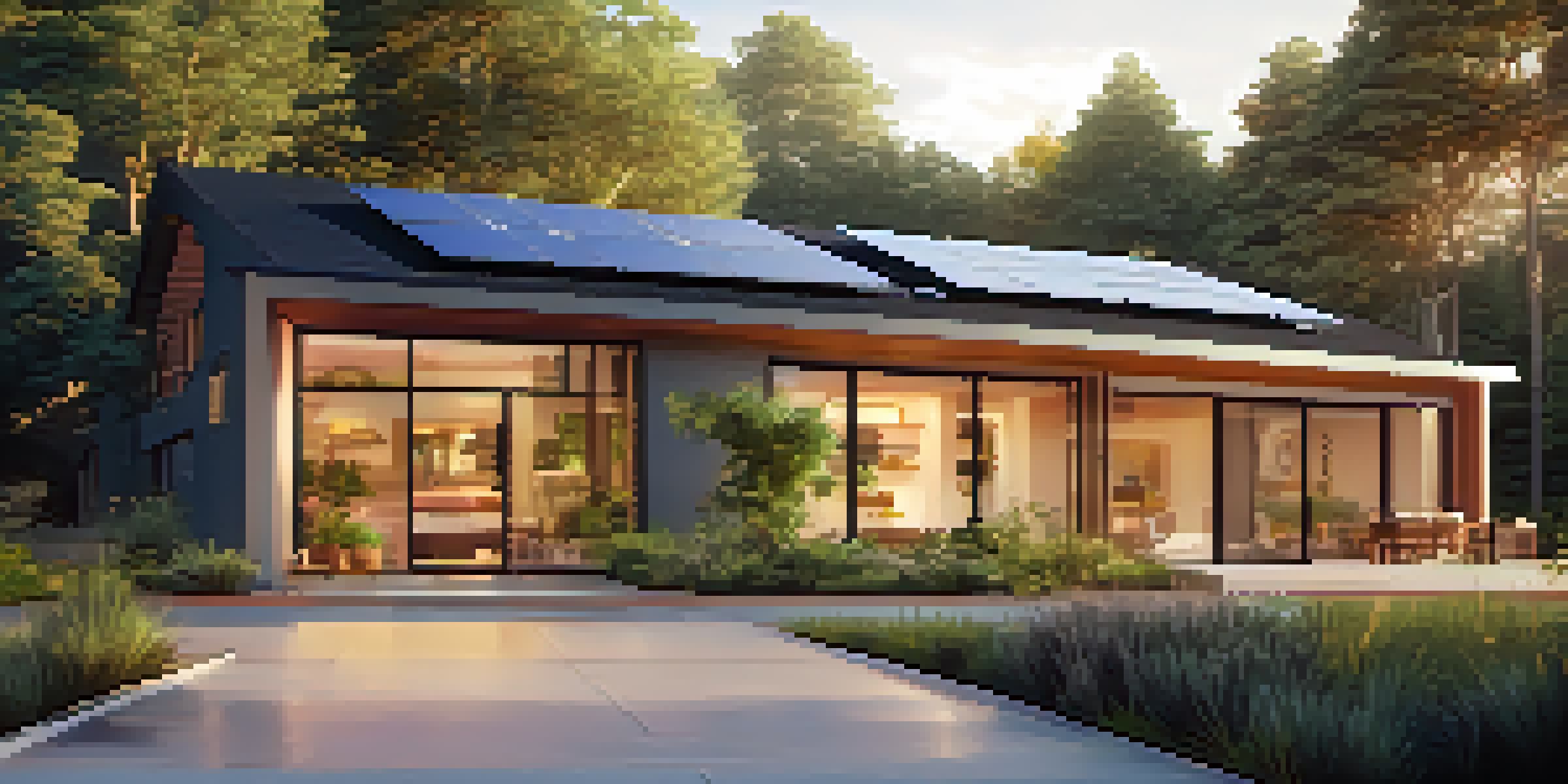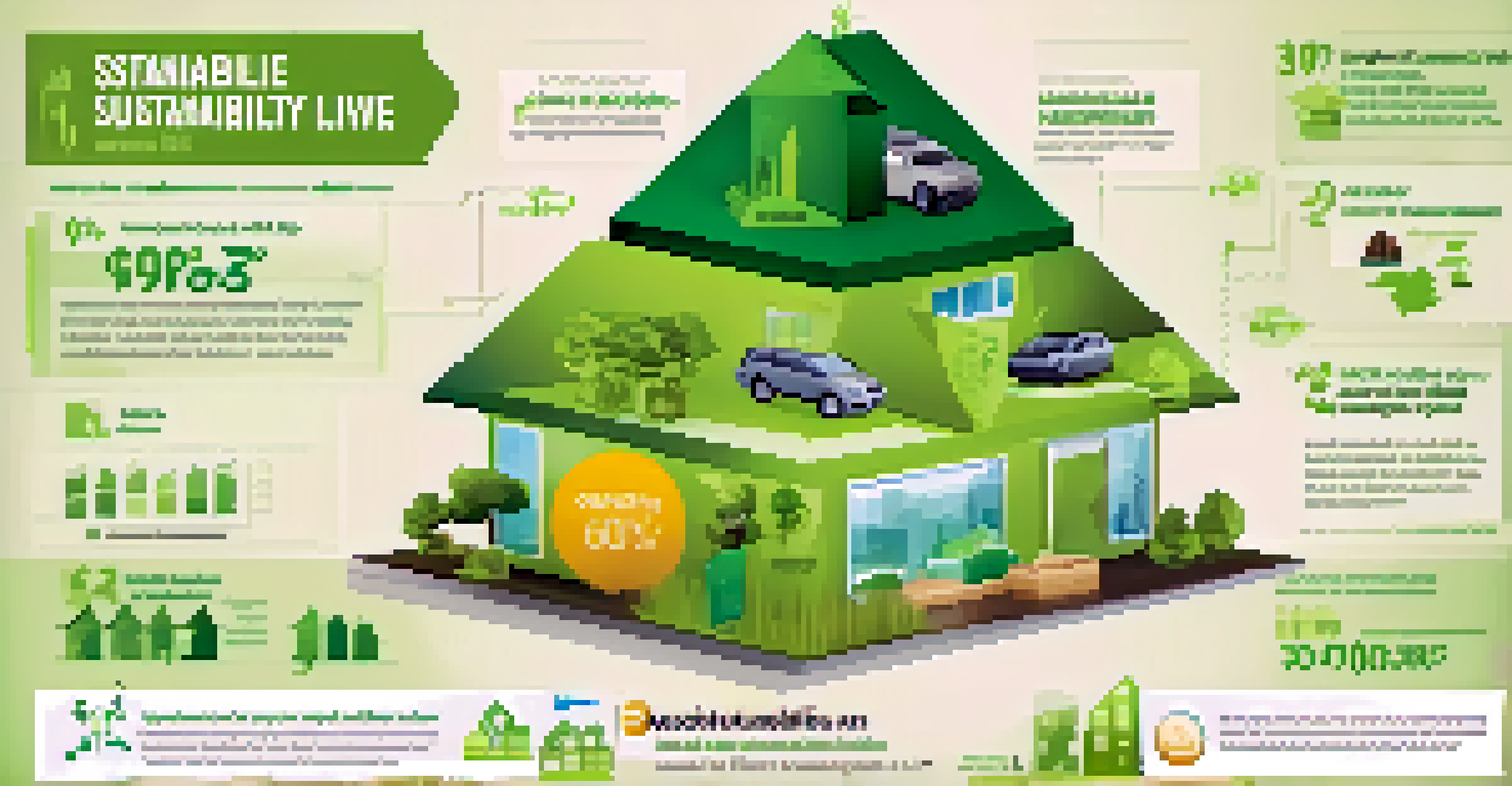The Rise of Sustainability in Real Estate Marketing

Understanding Sustainability in Real Estate Marketing
Sustainability in real estate marketing refers to promoting properties with environmentally friendly features. This includes energy-efficient appliances, sustainable materials, and eco-friendly landscaping. As consumers become more eco-conscious, they are increasingly looking for homes that align with their values. Real estate agents are now tasked with highlighting these sustainable aspects to attract potential buyers.
Sustainability is no longer a trend; it’s a requirement for future generations.
When a property is marketed as sustainable, it often stands out in a crowded market. Buyers are not just looking for a place to live; they want to feel good about their choices. Features like solar panels or green roofs can significantly influence a buyer's decision. By effectively communicating these benefits, real estate professionals can meet the demands of a growing market segment.
Moreover, incorporating sustainability into marketing strategies can enhance a brand's reputation. It shows that a real estate agent is not just selling homes but is also invested in protecting the environment. This commitment can lead to stronger relationships with clients and create a loyal customer base.
The Growing Demand for Eco-Friendly Properties
The demand for eco-friendly properties has surged in recent years, with more buyers prioritizing sustainability. A recent survey showed that a significant percentage of homebuyers prefer homes with green certifications. This shift in consumer preference is driving real estate agents to adapt their marketing strategies. By emphasizing sustainable features, they can cater to this growing market.

Younger generations, in particular, are keen on making environmentally responsible choices. They are more likely to invest in properties that promise lower utility bills and a reduced carbon footprint. This demographic often does extensive research online, making it crucial for real estate listings to highlight sustainability in their descriptions. A well-placed mention of energy efficiency could be the difference between a sale and a missed opportunity.
Sustainability Boosts Property Appeal
Marketing properties with eco-friendly features attracts buyers who prioritize sustainable living.
As a result, real estate marketing campaigns are increasingly showcasing eco-friendly aspects through various channels. Be it social media, websites, or print ads, the focus is on sustainability. This not only attracts eco-conscious buyers but also positions agents as forward-thinking leaders in the industry.
Marketing Techniques for Sustainable Properties
To effectively market sustainable properties, real estate agents can employ various techniques. Storytelling is a powerful method; sharing the journey of how a property was built or renovated with sustainability in mind can captivate potential buyers. This personal touch helps buyers connect emotionally, making them more likely to consider the property seriously.
The best way to predict the future is to create it.
Visual content, such as videos and infographics, can also play a pivotal role. Showcasing features like energy-efficient appliances in action or solar panels generating power can provide a clearer picture of the benefits. Additionally, before-and-after imagery of renovations can illustrate the positive impact of sustainability on a property's value.
Moreover, hosting open houses that emphasize sustainability can further engage interested buyers. Providing informational brochures about the sustainable features, along with expert talks on energy savings and eco-friendly living, can create a memorable experience. This hands-on approach not only builds trust but also encourages buyers to envision themselves in the space.
The Role of Technology in Promoting Sustainability
Technology is a driving force in the rise of sustainability in real estate marketing. Digital platforms make it easier to showcase sustainable features and reach a larger audience. For instance, virtual tours allow potential buyers to explore properties from the comfort of their homes, highlighting energy-efficient elements seamlessly.
Social media serves as an excellent avenue for promoting sustainable properties. Agents can share success stories, eco-friendly tips, and property features through engaging posts. This not only raises awareness but also fosters a community of like-minded individuals who value sustainability.
Tech Enhances Sustainable Marketing
Digital tools and platforms enable real estate agents to effectively showcase sustainable features to a broader audience.
Furthermore, data analytics can help agents understand buyer preferences better. By analyzing trends and feedback, agents can tailor their marketing strategies accordingly. This informed approach ensures that they are meeting the specific needs of eco-conscious buyers, ultimately leading to more successful transactions.
Case Studies: Successful Sustainable Real Estate Campaigns
Examining successful campaigns can provide valuable insights into effective sustainable marketing. One notable example is a real estate firm that rebranded itself as eco-friendly. By focusing on green building practices and highlighting sustainable homes, they saw a significant increase in inquiries and sales.
Another case involved a marketing campaign that utilized storytelling to highlight a home's sustainable features. The narrative detailed the homeowner's commitment to eco-friendly living, resonating with potential buyers who shared similar values. This emotional connection led to a quicker sale at a premium price, demonstrating the power of effective marketing.
These examples illustrate that sustainability is not just a trend but a viable marketing strategy. By adopting a similar approach, other agents can tap into the growing market of environmentally conscious buyers. The success stories serve as inspiration, showing that sustainability can be both profitable and impactful.
Challenges in Marketing Sustainable Properties
While the rise of sustainability in real estate marketing presents many opportunities, it also comes with challenges. One significant hurdle is the perception that sustainable properties are often more expensive. This misconception can deter potential buyers who may not fully understand the long-term savings associated with energy-efficient features.
Another challenge is the lack of standardization in sustainable certifications. Without universally recognized criteria, it can be difficult for agents to effectively communicate the true value of these properties. Buyers may feel overwhelmed by the options and unsure of what to look for in a sustainable home.
Education is Key for Agents
Ongoing education about sustainability equips agents to better market eco-friendly properties and overcome common misconceptions.
Additionally, not all agents are well-versed in sustainability, which can lead to inconsistent marketing efforts. Those who lack knowledge may struggle to effectively convey the benefits of eco-friendly features. To overcome these challenges, ongoing education and collaboration within the industry are essential.
The Future of Sustainability in Real Estate Marketing
Looking ahead, sustainability is set to play an even more prominent role in real estate marketing. As environmental awareness continues to grow, we can expect a shift in market dynamics. Properties with sustainable features will likely command higher prices and sell faster, making them a priority for agents.
Moreover, technological advancements will further enhance marketing efforts. Emerging tools and platforms will make it easier to showcase sustainable features and engage buyers. Virtual reality, for example, could allow potential homeowners to experience eco-friendly spaces in immersive ways, making the benefits more tangible.

Ultimately, as sustainability becomes ingrained in the real estate industry, agents who embrace this shift will stand out. By prioritizing eco-friendly marketing strategies, they can not only meet market demand but also contribute to a more sustainable future. This proactive approach will be essential for long-term success in an evolving real estate landscape.